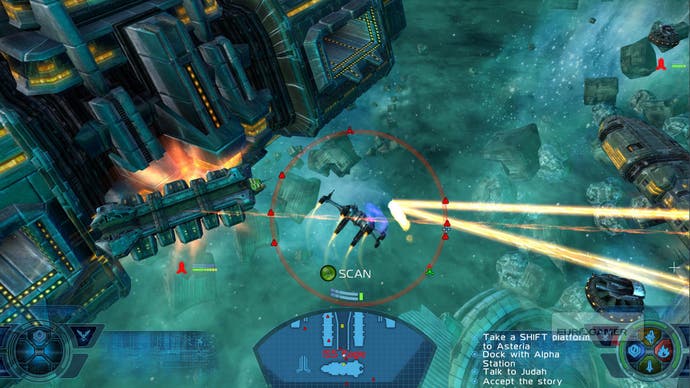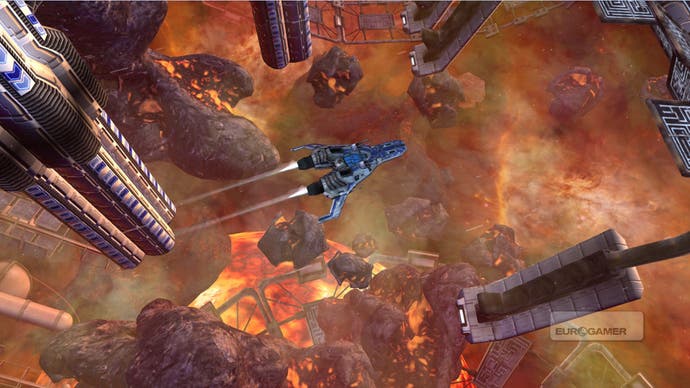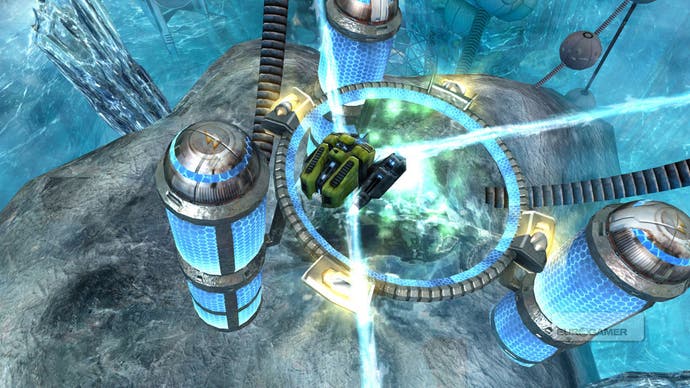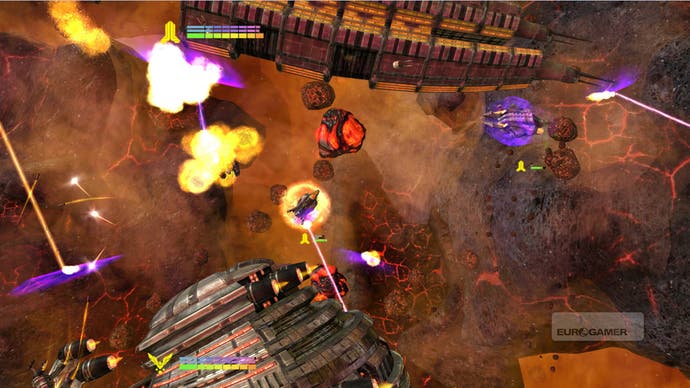Fusion: Genesis Review
Where no MMO has gone before.
You know that feeling when you really want something to be better than it is, to the point that you're actively willing it to improve even as the sinking feeling in your gut tells you it's too late? That happens a lot in Fusion: Genesis.
Not, as the name would suggest, a revolution in shaving from Gillette, Fusion: Genesis is the first game from Starfire Studios, which already brings emotional baggage to the table. Starfire is made up of former Rare employees whose CVs encompass a whole host of classic games. It's a small indie startup, populated by alumni of a beloved developer, and they've got ambition to burn.
Too much ambition, if anything. It seems weird and wrong to criticise an indie developer for reaching too high, but there's no escaping the sense that while Fusion: Genesis offers a dazzling array of gameplay ideas, few of them have been given any real depth. It's a spacebound action RPG-slash-twin-stick shooter with MMO aspirations, a sprawling genre mashup that struggles to contain all its big ideas.
You start out as a lowly lab assistant, cast to the whims of the spaceways when your mentor is killed. All you have to your name are a dumpy little spaceship, the name of a contact at a nearby space station and a Sentient, a mysterious AI pod that hovers around your ship.

From here you're free to sign up with one of five factions, which tick all the obligatory boxes. The Consortium fulfils all your corporate capitalist needs, with the SunShadow Syndicate their criminal smuggler flipside. The forces of law and order are represented by the Praetoriate, a cadre of hardline space cops, and the Dominion, a loose analogue for Star Trek's Federation, Mass Effect's Citadel and any other galaxy-spanning bureaucracy you care to remember. Finally, there's the Revenant Order, providing the requisite splash of religious zealotry.
Each has their own range of spacecraft, their own ranking system and their own small tier of upgradeable abilities. They also have their own storylines, with plot-nudging missions becoming available over time, but it's here that one of the game's weaknesses becomes clear: the missions are deathly dull.
Obviously, the spaceship motif limits what sort of interactions are possible, but the dearth of entertaining scenarios becomes wearying long before you've reached rank 50, halfway towards the game's level cap.
Most missions can be completed in just a few minutes and involve little more than flying to a "SHIFT" gate, warping to another location, flying around, blasting some enemies, maybe performing some token interactions and flying back again. The fact that the missions have titles such as More Watch Duty or Another Stakeout (sadly not the Emilio Estevez movie) says it all - this is a game with all the grind of an MMO with few of the genre's benefits.

Too many of them don't even bother to hide their purpose as mindless busywork. At one point I got a "destroy space junk" mission three times in a row. Even as a Level 31 Praetoriate officer, one of the missions on offer required me to do nothing more than fly to three waypoints and press A. That took all of 45 seconds, but netted me a healthy chunk of XP and a few thousand credits.
With progress driven by such uninspired grinding, there's no need to delve into the optional but entirely surplus interactions available elsewhere. You can buy and sell cargo but with no variable economy between the different spaceports there's no point. Ditto for the emergent tasks offered by each faction. Smugglers can attack victims and steal their goods, while Praetoriate ships can scan for illegal items and criminal fugitives. The Dominion can commandeer other vessels. It's a nice touch, but the gameworld is so drab and lifeless that there's little incentive to make a career out of such ambient opportunities.
Balancing is also crude, with the majority of enemies falling to your attacks almost instantly. That is, until you come across an inexplicable difficulty spike when suddenly a seemingly identical foe packs an impenetrable shield and weaponry that cuts through you like butter. That's your cue to head back to the mission menu and get back to the grindstone.
There's so much going on in the game that there's often not enough room to adequately explain it all. There are at least three areas of the screen where important information briefly flickers past, while the menus are both opaque and slow to respond. Additional power-ups for your ship can be picked up, but are given no explanation. If you want to make use of your new "strong slow misdirector" you need to burrow through several menu layers, before discovering what it does and how you use it.

The Sentients are another promising idea, sold short by a game design being tugged in a dozen different directions. These AI assistants can be levelled up by mining crystals from asteroids and other space debris (aka "waiting next to them and pressing A") but, again, opacity creeps in. There are different colours of crystal. Do they provide different benefits to your Sentients? The game doesn't say, so you just set it to upgrade automatically and periodically check back into the menus to spend XP points on incremental improvements to abilities that are equally vaguely explained.
Levelled up Sentients can be bought and sold in an auction house, which operates in harmony with the WP7 mobile game Fusion: Sentient, but this is another element that feels superfluous. With only a few Sentient types to choose from, all of which get the job done without too much work, there's no pressing need to waste your in-game cash on someone else's leftovers.
Even the multiplayer element feels foggy and confused. Other gamers will share the same game space as you, and you can form squadrons of up to four players. Yet there's no way to track the members of your squadron, or to ensure that you're doing the same missions. At one point I found I'd picked up a teammate who promptly began doing different missions. As the game only allows one active quest at a time, that meant I couldn't choose what I wanted to do. Yet when I embarked on the quests my new partner had chosen, they were nowhere to be seen. As an MMO experience, it's sorely lacking.
A couple of bonus modes fare better. Legion War is a co-operative survival mode with tower defence overtones, as you defend Alpha Base from Dark Legion incursions. It's basic, but fits better with the online aspect than the main game. A PVP arena, only open to members of the Dominion and Revenant Order factions, also benefits from having much of the clutter from the rest of the game stripped away.

There's no pleasure in finding fault with a well-intentioned game like Fusion: Genesis, but nor is it the sort of game that can be recommended with any confidence. It has good points - the visuals and music are both stunning, and the core concept manages to peek through the tangle to remind you why games like Elite and Freelancer endure - but for too much of its playing time you're doing nothing more exciting than flying sluggish spaceships through empty maps, performing rote tasks in a never ending search for more XP.
Those problems lie at the heart of a lot of MMO games, but Fusion: Genesis never gives you the immersion or sense of ownership needed to get past the drudgery. Spaceships purchased while playing for one faction are taken away should you switch sides, while the top-down viewpoint and absence of any meaningful characters mean you never make that all-important mental leap and imagine that there's a tiny digital you sitting in the cockpit. You're never inside the game's world, in the way a true MMO demands.
Had Starfire focussed on just a couple of elements rather than trying to be all things to all players, had it made the quests more varied, the progression more enticing, this could have been the start of something really special. As it stands, it's the epitome of a game trying to be a jack-of-all-trades, sadly mastering little.


